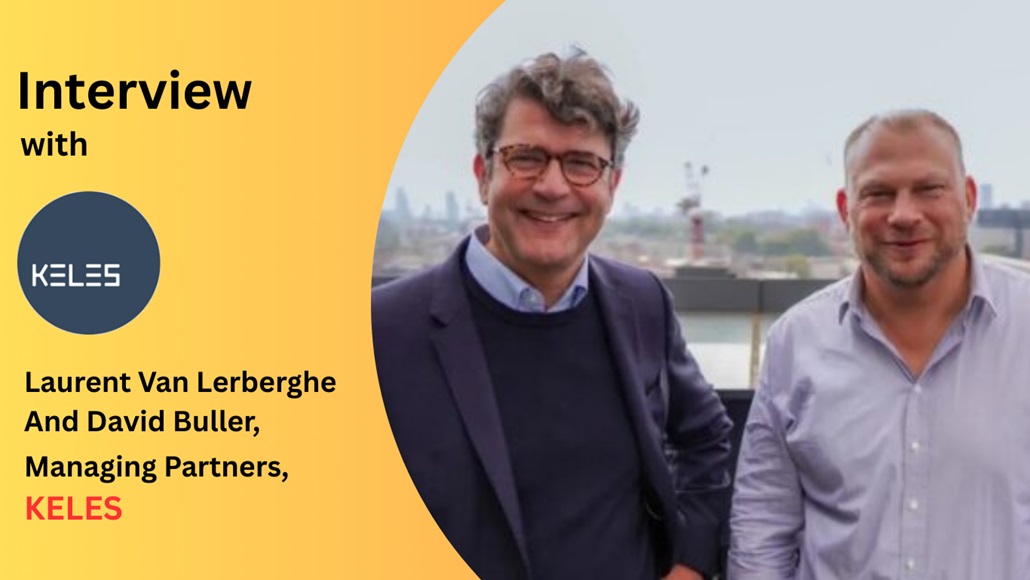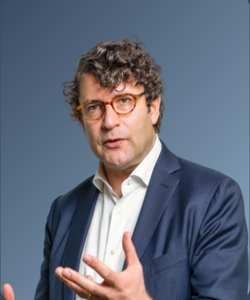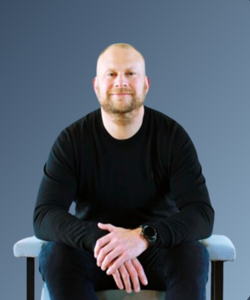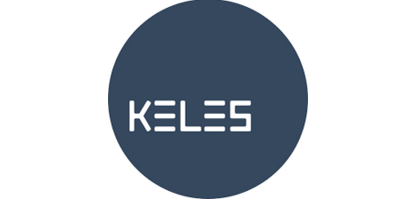In this exclusive interview, World Pharma Today sits down with Laurent Van Lerberghe and David Buller, the Managing Partners of KELES, deeply engaged in ethical AI investments, particularly within the healthcare and pharmaceutical sectors. The conversation explores their insights into the role of ethical AI in business, challenges in transparency and accountability, compliance with evolving regulations, and how to effectively measure societal impact in AI-driven healthcare solutions.
____________________________________________________________________
World Pharma Today:
Q. Ethical AI has become a widely discussed concept, especially in healthcare and pharmaceuticals. But when we speak specifically about ethical AI-driven businesses, how do you define them?
Laurent Van Lerberghe:
I’ll start here. Ethical AI, particularly in healthcare, is absolutely indispensable. We’ve worked closely with patients and treatments for many years, and ethics has always been our guiding principle. Now, with AI, that foundation remains unchanged — but we must establish clear rules governing its use.
One of the most critical aspects is how we handle, access, and utilize patient data. Patient data is essential for developing robust AI tools that can support treatment and diagnosis. However, it’s imperative that this data is anonymized and that we maintain absolute respect for patient privacy. We don’t view these regulations as limitations; rather, they provide a structured framework within which we can responsibly harness AI’s potential.
Another pivotal point is our ethical obligation to employ AI in healthcare. AI accelerates research, enables remote digital trials, supports diagnosis, and elevates overall patient care. So, in many ways, there’s an obligation to leverage AI to deliver better outcomes for patients.
_______________________________________________________________________
Q. Ethics is indeed the core of any business. But when it comes to transparency and accountability in healthcare, especially with AI, what are the biggest challenges you foresee? How are you ensuring that these principles are upheld?
David Buller:
One of the biggest challenges is the sheer number of stakeholders — healthcare providers, payers, clinicians, patients, technology partners. It’s not a single entity overseeing everything, which naturally adds complexity.
The key is fostering trust across the entire ecosystem. Transparency and accountability must be embedded from the outset to engage all stakeholders effectively. This trust is fundamental to making AI in healthcare not only viable but genuinely impactful for patients and the broader community.
Laurent Van Lerberghe:
Exactly. Building this ecosystem responsibly is crucial. Together with David, we’ve been very deliberate in choosing world-class partners — not only the teams we work with directly but also the startups that KELES invests in.
In Europe, for example, GDPR has been a transformative force. Initially, it raised significant challenges, but over time, it has become standard practice, even for startups. GDPR has introduced essential guardrails, which enhance patient confidence in how their data is managed.
_______________________________________________________________________
Q. Speaking of compliance, there are many evolving regulations worldwide concerning data security. As investors, how do you evaluate AI startups to ensure they comply, especially with European data protection laws?
David Buller:
This is part of our SFDR framework. Ensuring compliance is absolutely essential. In some ways, it’s become more straightforward — regulations like GDPR, the EU AI Act, and others have become baseline expectations for companies. We require our portfolio companies to actively report on their compliance, and we conduct our own rigorous checks.
However, it’s about more than just meeting regulatory requirements. Regulations are necessary but not always sufficient. We focus on ensuring that proper guardrails are established, not merely as control mechanisms, but as tools to drive ethical AI adoption. For example, AI can play a pivotal role in addressing bias and improving diversity in clinical trials and diagnostics, ensuring broader patient inclusion.
So, it’s not just about ticking boxes — it’s about embedding ethics into practice through AI.
_______________________________________________________________________
Q. How should investors and startups work together to achieve social objectives, especially when both have different focuses? How do you measure the social impact of AI-driven healthcare solutions alongside your financial returns?
Laurent Van Lerberghe:
Measuring the social impact of AI-driven healthcare solutions, alongside financial returns, involves multiple layers. First, there’s regulatory compliance. Many of the companies we engage with must obtain local or European certifications, which set essential benchmarks. These companies often collaborate with platforms like Apple Store, Google Play, or partner directly with hospitals, all of which require strict certification protocols. These layers serve as critical safeguards.
Moreover, as investors, we proactively share insights with startups when we identify potential risks, helping them navigate challenges early. Take GDPR, for example — companies have had to significantly elevate their standards, which has notably improved data protection practices.
With new regulations like the AI Act and Data Act, startups must remain agile. While they may not possess the same data access as tech giants, there’s a clear cultural shift toward integrating these regulations into daily operations. What once seemed complex has evolved into routine practice. We specifically seek out companies where compliance is not an afterthought but an integrated, automated part of their business model.
The second crucial factor is ensuring that these companies are genuinely leveraging AI. Honestly, in today’s healthcare landscape, it’s becoming ethically questionable not to use AI. Our objective, through the funds we provide, is to accelerate AI adoption and propel the transformation of the healthcare sector.
David Buller:
To build on that, when it comes to measuring societal impact, we look at both macro and micro levels. Broadly, we aim for greater healthcare accessibility, improved service availability, and enhanced patient outcomes. These are our long-term benchmarks.
In the short term, we focus on tangible indicators:
- Is healthcare becoming more efficient?
- Are we reaching more patients at lower costs and in shorter times?
- Are diagnoses happening faster?
- Is prevention more achievable?
- Can new drugs be developed more swiftly and affordably?
These metrics help us track the societal value of AI-powered healthcare solutions. Ultimately, they provide a clear pathway to understanding how these innovations are not only reshaping the healthcare landscape but making a meaningful difference in people’s lives worldwide.
_______________________________________________________________________
Q. You’re also active in the Middle East and Singapore. How do you see the European healthcare system differing from other regions? What does it take for Europe to lead globally in AI for healthcare?
Laurent Van Lerberghe:
If we’re discussing Europe’s leadership in AI, it’s clear that Europe — including the UK and Switzerland — has an exceptional talent pool, especially within our universities. Europe is undeniably at the forefront in knowledge creation and AI advancements. I recently attended a conference at Hôtel-Dieu in Paris, one of Europe’s oldest hospitals. We had American participants there, and they were genuinely impressed by the level of innovation here. They certainly don’t view Europe as lagging; in some areas, they even see us leading.
However, one of the challenges they highlighted is scalability. In the U.S., despite its complexities, you can scale innovations relatively quickly due to the market’s size. For Europe, the next major step is mastering how to scale rapidly, and this is a priority for us at KELES.
Another critical point is ensuring that innovations are widely accessible across Europe. We want advancements in diagnostics and patient care to reach beyond wealthier populations or select facilities. Our goal in R&D is to accelerate the pipeline and deliver innovations to patients sooner. I’ll pause here and let David share insights about regions like the Middle East and Asia.
David Buller:
Yes, I think it’s important to recognize that Europe — including the UK — is arguably third globally in healthcare innovation. Look at DeepMind’s AlphaFold, developed alongside the European Bioinformatics Institute in Cambridge. We’re witnessing groundbreaking work, particularly between France and the UK, in AI and drug discovery.
We already have a strong foundation. The next step is to continue investing in R&D and supporting startups from university spinouts through their entire funding journey — from seed stage to growth stage, where KELES typically steps in. We’re fully committed to building on this momentum and elevating Europe’s position on the global stage.
_______________________________________________________________________
Q. When evaluating startups, two critical factors come to mind: innovation and ethical responsibility. What parameters do you consider when assessing startups, and what is KELES’ long-term vision in this space?
Laurent Van Lerberghe:
You know, KELES is Europe’s first digital health fund certified by PwC as an SFDR9 fund. This distinction stems from our firm commitment to these priorities. We collaborated closely with PwC to craft a highly specific framework, which ensures our investments are consistently steered in the right direction.
That framework reflects the clear vision that David and I share for KELES. To be specific, we place the ‘S’ of ESG and governance at the very heart of our approach to digital health and healthcare more broadly. One of our foremost criteria is accessibility—ensuring that the largest possible population can benefit from the solutions being developed. The next is availability—guaranteeing that these treatments, diagnostics, and innovations are not just theoretical but actively implemented in real-world settings.
From an environmental standpoint, we prioritise solutions and companies that avoid causing significant harm, establishing appropriate safeguards from the outset. And of course, governance is absolutely vital. We ensure that the companies we back uphold robust governance structures and align with best practices.
Our approach is highly pragmatic and actionable, equipping us to genuinely guide companies towards achieving these standards. I firmly believe that this methodology not only fosters positive social impact and ethical responsibility but also propels superior performance in the market. It’s about achieving both: meaningful social contribution and strong returns.
David Buller:
Exactly, and to build on that, there’s obviously the crucial aspect of governance and ethical safeguards, particularly regarding ethical AI. As Laurent highlighted, it’s all about striking the right balance between driving high returns and maintaining ethical integrity. Ultimately, superior returns are generated by breakthrough, transformative technologies — innovations that revolutionise healthcare systems, redefine patient care pathways, and accelerate drug development in life sciences.
So, what we’re actively seeking are innovative technologies with global scaling potential, while ensuring that these advancements operate within the essential frameworks of ethical AI and sound governance.
_______________________________________________________________________
Q. What specific gaps did you find in the market that motivated you to launch KELES?
Laurent Van Lerberghe:
The gap we identified primarily revolves around scaling innovative companies. Over the past decade, we’ve witnessed incredible innovations emerge across various countries and regions. Now, the imperative is to elevate these innovations to a much larger scale, so they can truly drive availability and accessibility, and transform healthcare as patients experience it every day.
Our central mission at KELES is to target growth-stage opportunities, with the ambition of creating category leaders — what we call alpha unicorns — in Europe, and ultimately, global champions. These companies will expand patient options for managing their healthcare, which remains a clear objective for us.
If we look at the three segments we prioritise: firstly, accelerating R&D to bring new molecules to market — an area still marked by significant unmet needs. Secondly, diagnostics, where AI and advanced imaging technologies are driving rapid progress and unlocking tremendous potential. Thirdly, patient care, both within hospital settings and beyond.
One more point — without AI and funds like KELES, we risk continuing the situation we currently face in Europe and other parts of the world: aging populations, shrinking healthcare workforces, and overburdened hospitals. Digital tools and AI can empower the remaining healthcare professionals, allowing them to deliver high-quality care to more patients. Through a fund like KELES, which scales these solutions, we can enable the widespread adoption of these innovations across Europe and beyond.
David Buller:
To add to that, what KELES offers — and what we identified as a major market opportunity — is the chance to harness this immense wave of innovation within Europe. These trailblazing innovators urgently need funding at the growth stage, along with deep industry expertise.
Between Laurent, myself, and our extensive team of advisors, we bring profound experience across AI, global pharmaceuticals, and healthcare systems. We’re not merely providing capital; we’re delivering a comprehensive framework — encompassing SFDR compliance and ethical AI and healthcare data practices — to truly improve healthcare outcomes. This complete package is what we’re bringing to the table to advance innovation in AI and healthcare, especially across Europe.
_______________________________________________________________________
Q. Would you like to add anything further about KELES’s objectives in the market, or share any advice or insights for our audience before we conclude?
Laurent Van Lerberghe:
Yes, to summarise a few essential points — KELES is fundamentally a growth-stage digital health fund. We’re aiming for €250 million in assets under management, and we’re confidently on track for our first close in the first half of 2025. We have a pan-European scope, including the UK and Switzerland, because integrating diverse markets is key to achieving scale.
KELES is addressing a distinct market gap: there are remarkably few growth-stage funds capable of providing substantial investments. Moreover, profiles like David’s, mine, and those of our wider team — all experienced healthcare operators — are precisely what is required to guide these companies successfully through the scaling process in Europe.
We’re standing at the beginning of an exciting growth wave. We anticipate seeing several companies reach critical inflection points, unlocking remarkable value creation.
David Buller:
Building on Laurent’s points, my advice to companies either embarking on their innovation journey or approaching a scaling inflection point is this: don’t be disheartened by regulations or the perceived scarcity of growth-stage capital. KELES exists to bridge precisely this gap.
There’s a tremendous opportunity waiting to be seized. And when it’s done right — with ethical AI, robust governance, and a relentless focus on improving health outcomes — the impact can be truly transformative. Our entire team, along with the capital and expertise we bring, is committed to helping these companies realise their potential and deliver meaningful outcomes.
_______________________________________________________________________
As our conversation with Laurent Van Lerberghe and David Buller draws to a close, it becomes clear that KELES is not only investing in groundbreaking AI innovations but is equally steadfast in embedding ethics, transparency, and societal impact at the core of its mission. Positioned at the forefront of Europe’s digital health evolution, KELES combines powerful capital, deep healthcare expertise, and an unwavering commitment to ethical AI and governance.
Their vision reinforces a future where healthcare solutions are not only pioneering but also accessible, trustworthy, and transformative on a global scale. By guiding visionary companies toward sustainable success, KELES is paving the way for a new era of healthcare innovation — one where patients, providers, and innovators collectively benefit, and the promise of meaningful, lasting impact is fully realised.























